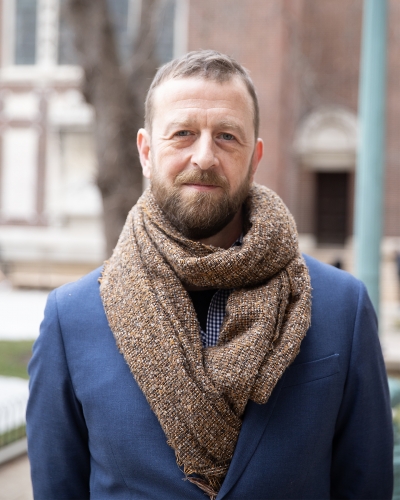
Emma Asher
In this series, we speak with professors who lead different sections of the Core Curriculum to learn what they love about engaging with College students. This month we chat about Lit Hum with Matthew Hart, professor of English and comparative literature. Hart specializes in 20th- and 21st-century English literature, with an emphasis on modernism, poetry, contemporary writing and literary theory.
What is the best part about teaching the Core Curriculum?
First, you get such a variety of students from different disciplines and majors. You’re teaching these incredibly smart, incredibly engaged undergraduates, who all chose to come to the College knowing that they are going to do Lit Hum in their first year. For some of them, it might be the only literature class that they take, and so there’s this profound engagement from many of them. The way the students bond with you and with one another over the course of two semesters is incredible.
The other thing is the way the Core builds connections among the faculty; you’re part of a common pedagogical and intellectual project. There’s something about the Core — the uniformity of it, the ambition of it, the scale of it as an enterprise. The fact that you and your fellow faculty members are teaching varieties of the same syllabus gives you a common language that you can use to talk about undergraduates; to talk about your work; and to anchor your research and your projects relative to others. The Core builds a common language, both among the student body and the faculty.
How do you bring your own spin to Lit Hum?
I like to emphasize the strangeness of the Core. So rather than going to Homer and saying, for instance, “How is Homer like us?” or “How is the world of Homer’s epic a world that is similar to our world?”’ instead I like to begin from the opposite point of view: “What are all the ways in which the value system, the social norms, the cultural mores of that world are alien from us?” Thinking about the strangeness and the distance between us and the texts we read — not in order to push students away from them or to alienate them from them — but so we can approach them from outside the confines of our own current concerns and preconceptions. It requires a kind of imaginative and intellectual willingness to engage with otherness, to engage with difference and to think about change over time in a significant way.
What has been your favorite Core teaching moment?
My favorite assignment is called the annotation assignment. It asks students to pay close attention to one page of one text, with a level of detail to the history and meaning and the subtleties of language. And they tend to really go to town on it; generally, in evaluations or in feedback I get from students, it’s one of the assignments that they’ve singled out as being a high point of the semester. The quality of the work that that assignment has generated over the years — I repeatedly find it astonishing. It’s not just the amount of labor that students will put into an assignment like that, but it’s also the creativity and the imagination with which they think about the relationship between genre and history, and language and ideas. So that’s a perennial point of excitement for me